Sounds of Feminism
Want to learn more about feminism? Every week we'll be sharing critical feminist conversations and insights on key concepts, ideas, and debates that shape our everyday lives.
Sounds of Feminism Heading link

Words and ideas matter. So does form. WLRC’s “Sounds of Feminism” is intended to educate, engage, and inspire. How? By featuring critical feminist conversations about history, politics, media, culture and beyond. Whether you are new to feminist struggles and debates, or have weathered all the ups and downs and are still waving your flag, you will find “Sounds of Feminism” useful, provocative, and always loudly pushing for justice.
It doesn’t matter how you got to UIC—you might never have had a full discussion about what feminism is (and is not) before this moment. You might have been active in your high school’s GSA. Or participated in the fun and fierce global street performances protesting gender-based violence before COVID-19 sent us all inside. Or didn’t care about any of it. You may have registered for GWS 101 not knowing what you were in for. Or, you are well on your way toward a career: writing and creating art about prison abolition, working in a reproductive justice organization, running your own nonprofit.
Regardless, know that nothing is static, including feminism. Not all feminisms are equal either: depending on who is speaking and what they are talking about, issues of power—not only based on gender, but also race, economic status, language, religion, nationality, etc.—create differences that matter. Which versions of feminism you have learned about, the issues that get identified as feminist, and even who calls themself a feminist—all are based on power relationships.
“Sounds of Feminism” is intended to make those issues of power visible. We offer this as a tool for everyone to learn the importance of history and how to use language to heal and build bridges, how to speak back to power, and how to work in solidarity with communities that might be different from the ones that we identify with. Mostly though, “Sounds of Feminism” is about helping you make your own sounds, as you find a feminism that you can own.
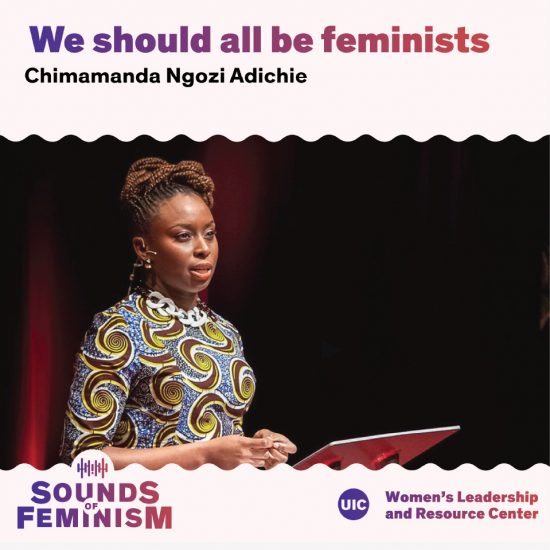
We Should All Be Feminists Heading link
“We teach girls that they can have ambition, but not too much … to be successful, but not too successful, or they’ll threaten men,” says author Chimamanda Ngozi Adichie. In this iconic speech that began a worldwide conversation about feminism, Adichie asks that we dispose of our preconceived notions of feminism and plan for a different, fairer world.
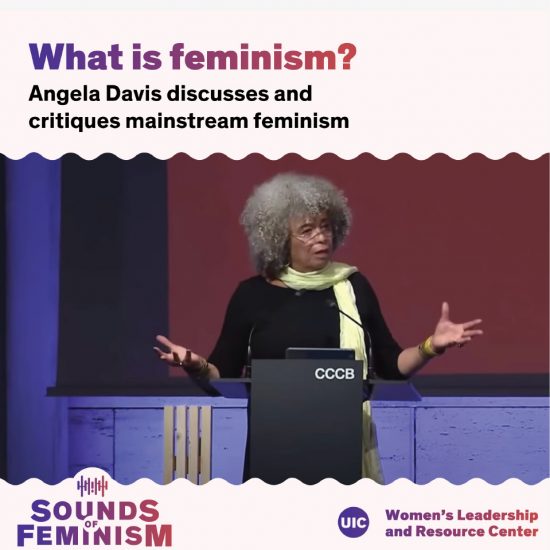
What is Feminism? Heading link
“If we acknowledge Black women, Muslim women, indigenous women, working class women… We will rise with them,” says civil rights activist and author Angela Davis. In this beautiful talk which critiques U.S. mainstream feminism, as well as introduces the idea of intersectional feminism, Davis asks that we acknowledge our own privilege and challenge existing societal norms.
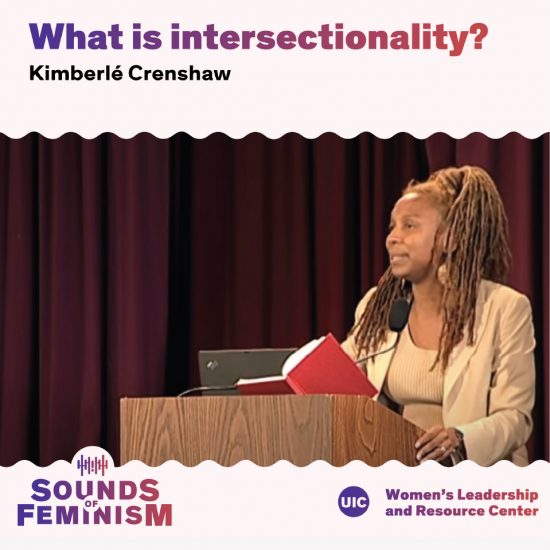
What is Intersectionality? Heading link
This clip explores the history of feminism and critiques the women’s suffrage movement for its failure to include women of color. We must strive for an inclusive, feminist movement and we must understand that means listening to and involving all women, in all their diversities.
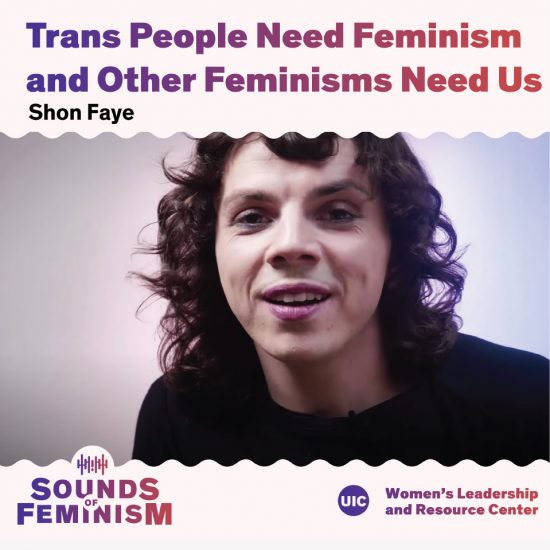
Importance of Transfeminism Heading link
“Any feminism worth a damn recognizes that the concepts of patriarchy and misogyny are not experienced by all women in the same way,” says writer and artist Shon Faye. In this informative video which introduces and defines patriarchy and misogyny and their roles in society, Shon Faye questions mainstream feminism and the core shared goals in a trans-inclusive feminism–including healthcare, employment, and housing.
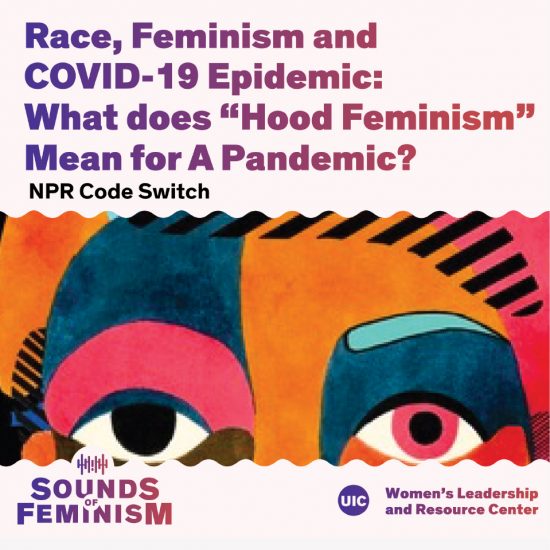
Hood Feminism and COVID-19 Heading link
“Feminism isn’t just failing low income women of color; it’s failing everyone that’s not an upper middle class white woman at this point,” says Mikki Kendall, author of Hood Feminism: Notes from the Women that a Movement Forgot. Especially as we embark upon this second wave of the pandemic, Kendall is asking us to reflect upon how COVID-19 has affected the lives of millions of families across the world– and especially the detrimental effect it has had on women of color.
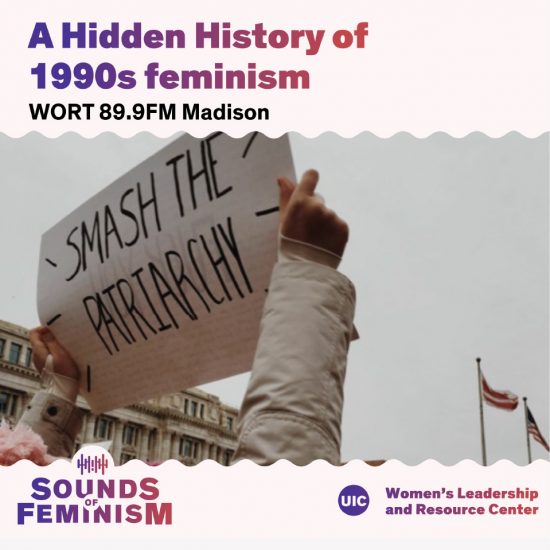
A Hidden History of 1990s Feminism Heading link
“I set out to research feminism in the 90s,” says Lisa Levenstein, “but the story I found was about women of color, working-class women, and LGBT activists.” In this podcast, Levenstein gives us insight about how understanding the difficult history of the United States and recognizing how the fight for gender equity that has taken place through marches and grassroots activism gives us the tools to organize under an intersectional banner for lasting change.
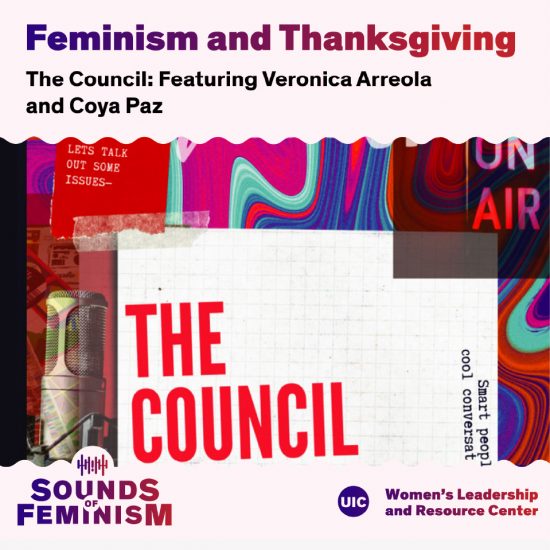
Feminism and Thanksgiving Heading link
Veronica Arreola, director of UIC’s L@s GANAS, and Coya Paz, chair of Theatre Studies at Depaul University, join the The Council podcast to discuss the division of labor and gender roles around the holidays, while giving guidance on how to navigate difficult political discussions. As we navigate the holiday season, it is important to recognize these struggles and what we can do to begin to change the gender expectations that are ingrained in society.
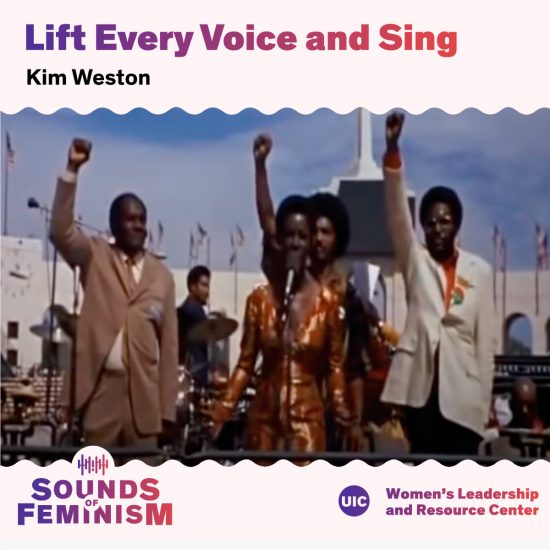
Lift Every Voice and Sing Heading link
“Sing a song full of the faith that the dark past has taught us,
Sing a song full of the hope that the present has brought us”
In 1972, Kim Weston, American soul singer, performed “Lift Every Voice and Sing” during a community commemoration following the 1965 Watts neighborhood uprising against police brutality and systemic discrimination. In celebration of Black History Month at UIC and in recognition of how Black women’s voice and performance have been important to Black struggle and resistance, we lift up the now-familiar song written by James Weldon Johnson and set to music by J. Rosamond Johnson in 1899.
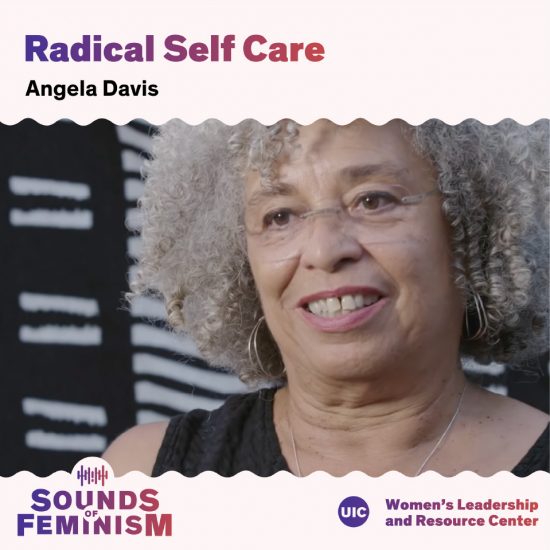
Radical Self Care Heading link
“I think that the self-care that gets produced by Black people recognizes the connection between struggle and art and beauty and the imagination.”
Angela Davis, activist and author, discusses how finding the time and resources to be able to nurture our minds and souls allows us to be able to bring our entire selves into the movement. We don’t have to do it alone– if we recognize these unjust systems and the ways they operate, we can work collectively to change them.
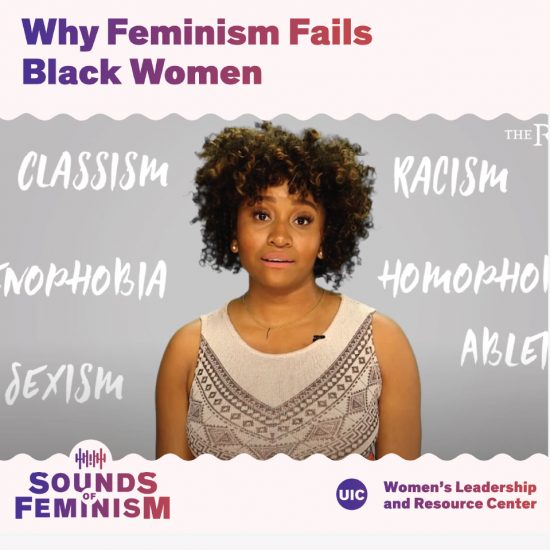
Why Feminism Fails Black Women Heading link
“Unlike feminism and despite its name, womanism does not emphasize or privilege gender or sexism. Rather, it elevates all sites and forms of oppression…to a level of equal concern and action.” –Layli Phillips, author of The Womanist Idea
Despite being historically left out of feminism, Black women have been creating their own political and social movements that don’t depend on traditional feminism and that work to bring to light the oppression that Black women face. One of these social movements is womanism, which is “a social framework that separates itself from feminism and centers Black women.”
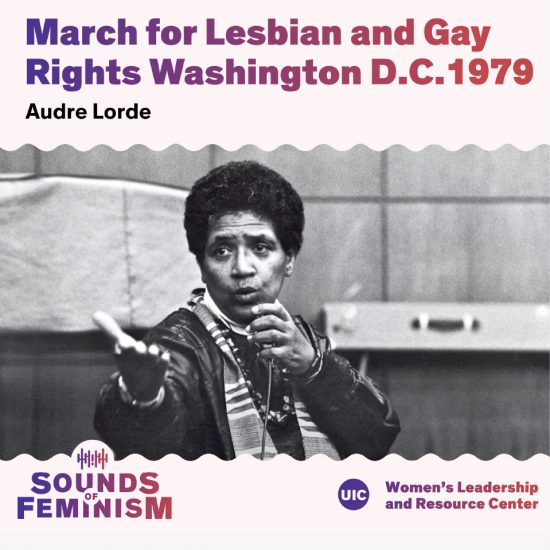
March for Lesbian and Gay Rights Washington D.C. 1979 Heading link
“I am proud to raise my voice here this day as a Black, lesbian feminist committed to struggle for a world where all our children can grow free from the disease of racism, of sexism, of classism, and of homophobia. For those oppressions are inseparable.”
In this powerful speech, writer and activist Audre Lorde calls on us to understand the struggles that are present within our communities and to translate it into daily action. She challenges us to work toward a future where every person can succeed and flourish–“for not one of us will ever be free until we are all free.” Lorde encourages us to recognize that our words and our actions can make an impact on the world and the people around us.
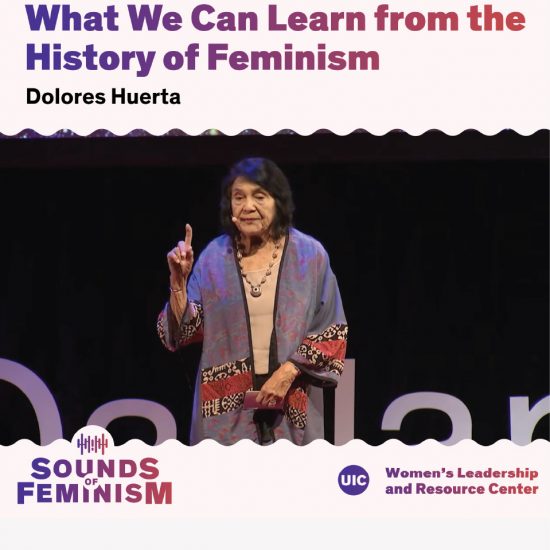
What We Can Learn from the History of Feminism Heading link
“Si se puede”
In a short but influential talk, Dolores Huerta — one of the most influential labor leaders and civil rights activists associated with Chicana feminism — poses questions about how to build a more just society, and suggests we turn to feminism and radical empathy for the answers. Chicana feminism is a sociopolitical movement that prioritizes the historical, cultural, and economic intersections of Chicana women. She encourages people to use their power to demand more from their institutions and communities.
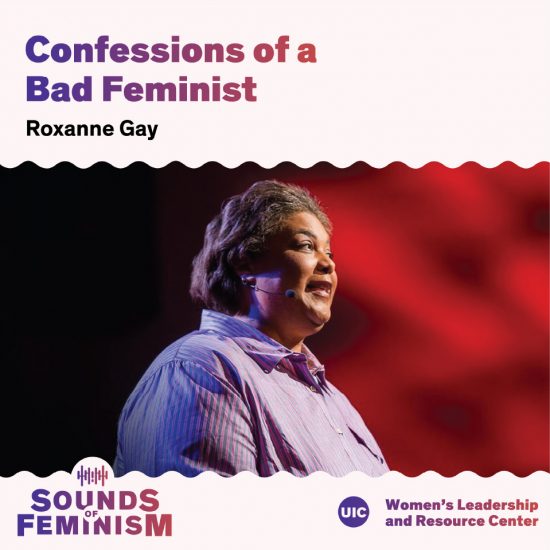
Confessions of a Bad Feminist Heading link
“I reject the mainstream feminism that has historically ignored or deflected the needs of women of color, working-class women, queer women and transgender women, in favor of supporting white, middle- and upper-class straight women. Listen, if that’s good feminism — I am a very bad feminist.”
In this thoughtful talk, writer Roxanne Gay rejects the idea of the “perfect feminist” that is represented in mainstream feminism and calls on us to be brave and find our own meaning of feminism.
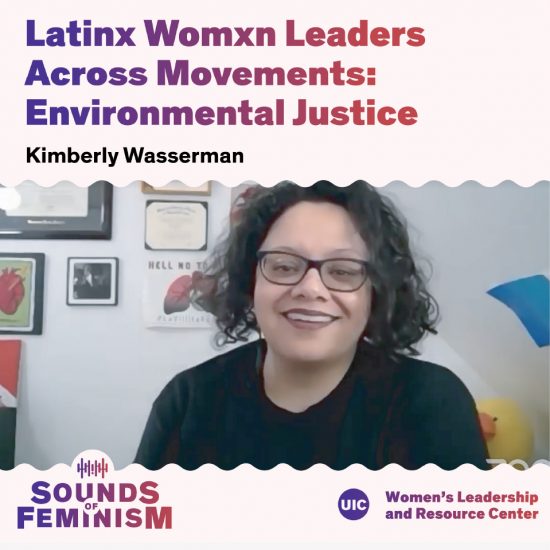
Environmental Justice Heading link
“The people who are feeling the impact of climate change, first and foremost, are the people who least contribute to climate change. Ninety-nine percent of the time that is either the poorest folks in our world and/or people of color in our world.”
Kim Wasserman, grassroots activist and director of the Little Village Environmental Justice Organization in Chicago, speaks about the importance of social justice movements centering the experiences and needs of those who are most oppressed and offers solutions based on self determination.
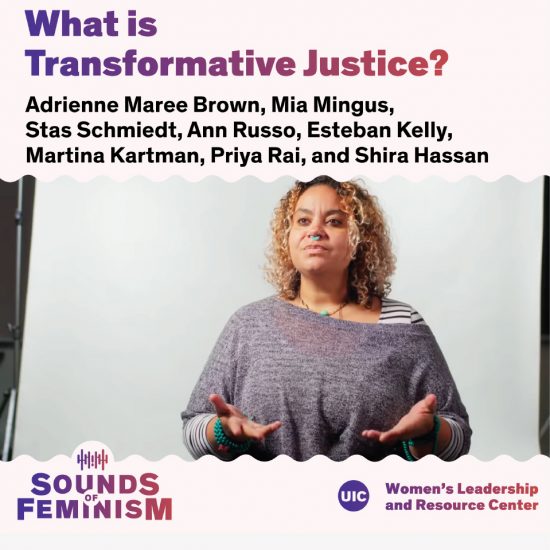
What is Transformative Justice? Heading link
“Transformative justice asks us not just about accountability for the individual for the harm that has been caused, but to think more largely about how all of us may…be a part of these systems that create the harm that we are trying to address.”
In this thought-provoking video from the Barnard Center for Research on Women, practitioners define the scope and potential of transformative justice. Transformative justice addresses not only the harm that occurs between two people, but also tries to address the conditions of the environment that allowed the harm to occur. It works to break the connection between justice and punishment and create accountability within our communities to break generational cycles of harm and violence.
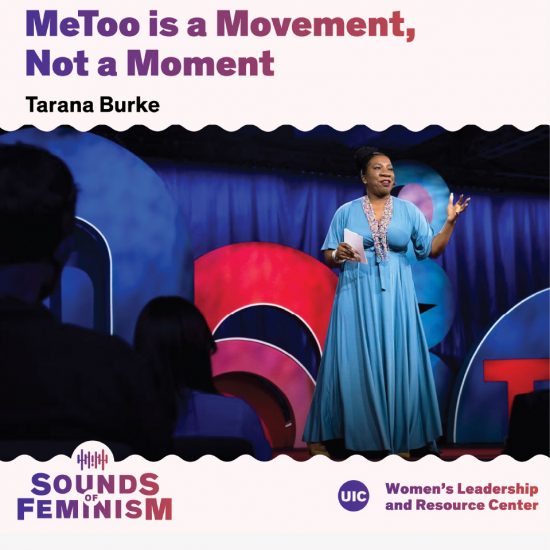
MeToo is a Movement, Not a Moment Heading link
“This is a movement about the far-reaching power of empathy. And so it’s about the millions and millions of people who, one year ago, raised their hands to say, “Me too,” and their hands are still raised while the media that they consume erases them and politicians who they elected to represent them pivot away from solutions.”
In this important talk, Tarana Burke, creator of the “Me Too” Movement, reflects on the impact of what has become a global movement and calls on society to dismantle the power and privilege that are the building blocks of sexual violence.